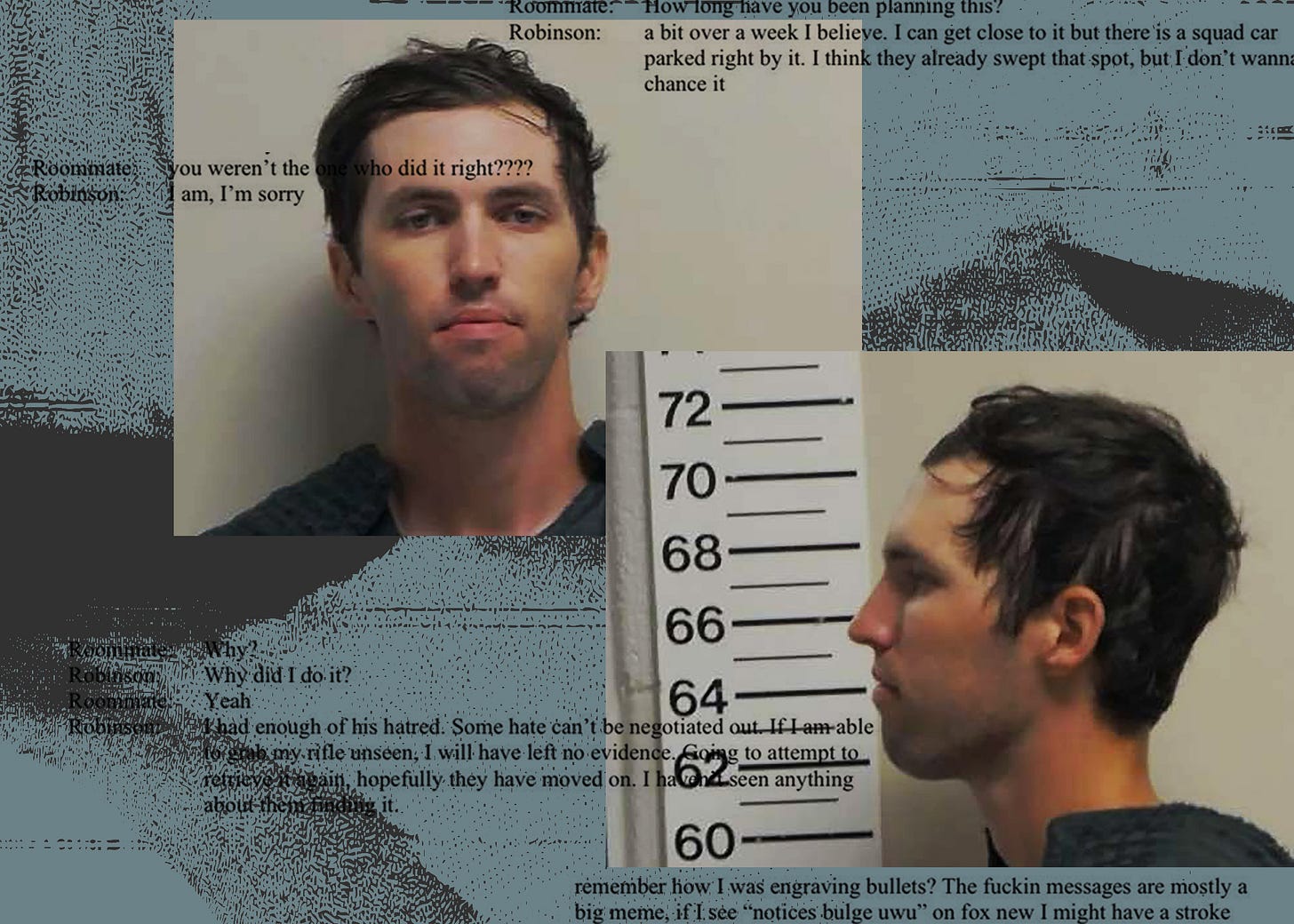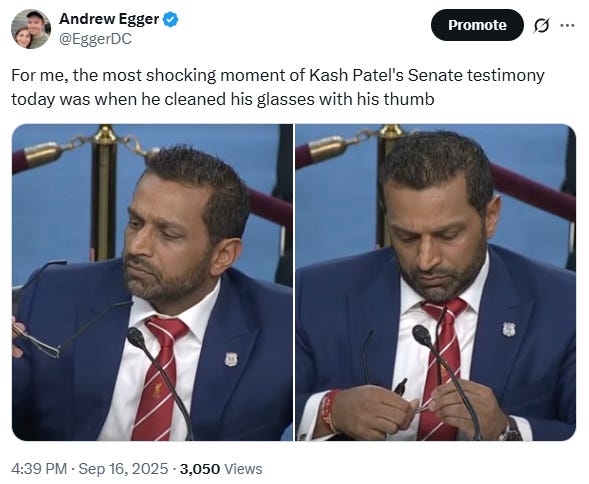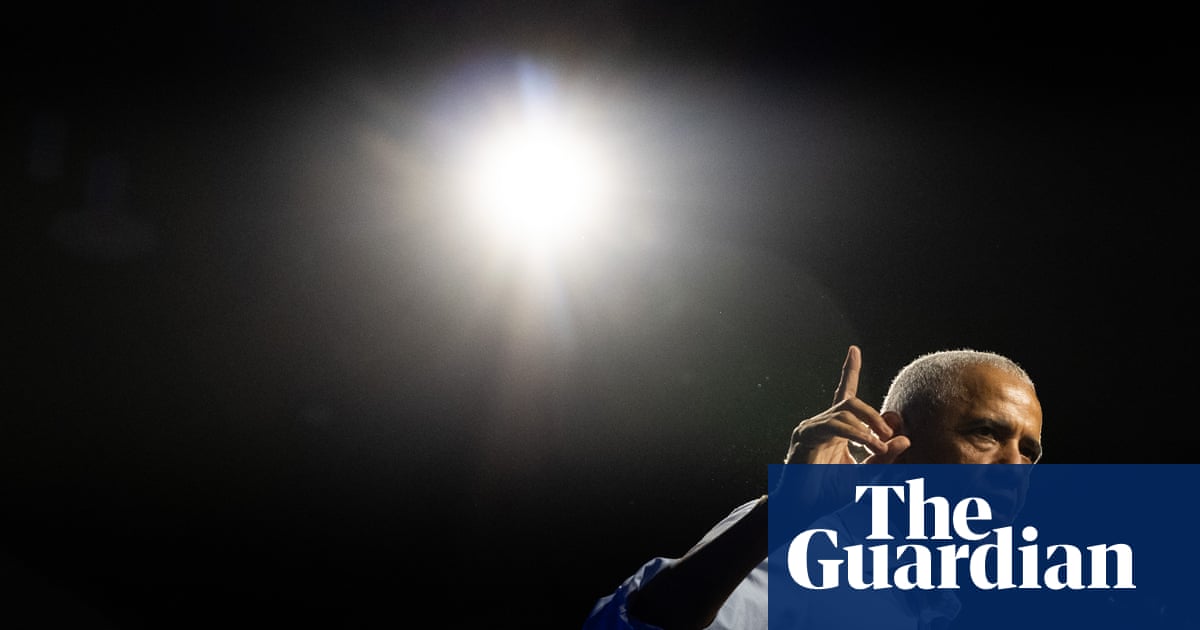Attorney General Pam Bondi learned a tough lesson yesterday: There are still some pieties of the old right that conservatives aren’t ready to abandon, and bristling at the concept of “hate speech” is one. One day after pledging to “absolutely target” anyone using “hate speech” in the wake of Charlie Kirk’s murder, Bondi walked it back, insisting she’d only meant speech that “crosses the line into threats of violence.” Happy Wednesday.
by Andrew Egger
The immediate aftermath of the assassination of Charlie Kirk presented us all with an epistemic challenge: What if the killer came from our tribe?
From the moment the heinous footage hit the internet, the likeliest explanation was that the shooter hated Kirk’s political activism, which would suggest he was likely of the political left.
But in the absence of concrete evidence to this effect, parts of the online left began pushing a different theory: that Kirk had in fact been gunned down by a disciple of fringe ideology further to Kirk’s own right. This “groyper theory” was rooted in a few true facts—Kirk had indeed clashed with followers of the white-nationalist podcaster Nick Fuentes over the years—but, again, there was never any actual evidence of it.
Now, we have some evidence. And it is time to move beyond those epistemic challenges.
Utah prosecutors unveiled charges yesterday against Tyler Robinson, Kirk’s alleged killer. And although they stopped short of declaring a motive, they offered the clearest insight yet into Robinson’s stated motivations. Although he was raised Republican, authorities said, citing his family, Robinson had moved left in recent years. He had a transgender partner, whom he had texted after the shooting to say he had had “enough of [Kirk’s] hatred” and that “some hate can’t be negotiated out.”
It is important, here, to make note of what prosecutors did not unveil. Speculation from the president and his allies notwithstanding, Robinson had no known association with “leftist” groups. We also don’t have much insight into the full breadth of his politics. While the picture of Robinson is being filled out, it also remains frustratingly incomplete.
But at this point the most salient fact now seems clear. Kirk was widely reviled on the left for his often noxious rhetoric about minorities in general and trans people in particular, and a person with a particular interest in sticking up for trans people shot him for it.
To deny this now is not just an act of willful blindness, it is deeply counterproductive. If we want to confront the problems of political violence—from the radicalization of our youth, to the toxicity of online culture and discourse, to the heightened possibility for damage in a nation awash with guns—we must first recognize how far the problem has spread, and to whom.
And yet, what’s clear about the aftermath of the Kirk shooting is that human beings find it a lot easier to rush to judgment than to rush back to realities. Some on the left have found themselves spinning ever more outlandish theories to explain away the Robinson texts. “No one is buying these text messages,” posted one prominent progressive influencer, JoJoFromJerz. “I don’t believe these text messages were written by Tyler Robinson for a second,” offered another poster in that mold, the account known as Brooklyn Dad. (In this matter, these accounts were making common cause with MAGA luminaries like Steve Bannon and Candace Owens, who have been similarly unable to let go of preconceived notions of the shooter’s motivations: in this case, that it was some larger, perhaps international, plot.)
This is ridiculous cope, and it should be treated as such. Healthy political movements do not baby their supporters by tying themselves into pretzels to explain away uncomfortable facts.
The reason the groyper theory took off is obvious: It has enormous emotional power for liberals who themselves hated Charlie Kirk’s advocacy in a more quotidian way. But falling back on comforting fibs, like the notion that political violence is something only the “other guys” do, is like wrapping yourself in a psychological security blanket—easier, warmer, safer.
It’s also deeply unhealthy, particularly when carried out at scale. We know this because we’re currently living through it.
A few years ago, everyday Republicans were confronted with the unpleasant fact about their own side’s capacity for political violence when a mob of MAGA supporters stormed and ransacked the U.S. Capitol, attempting to overthrow the 2020 election. Instead of allowing this fact to shape and recolor their views of their own movement, Republicans retreated frantically into comforting and then increasingly outlandish lies: that Donald Trump would be exiled, that it was a one-off, that the real perpetrators had been Antifa insurgents, or, later, that federal law enforcement had concocted the whole thing. Having soothed themselves back to sleep, those same Republicans then awoke to discover that that appetite for violence had swallowed their entire party. Before you knew it, January 6th choirs were singing at political events, the rioters were pardoned, and Ashli Babbit was getting a full military funeral.
There are many obvious differences, of course, between the sort of political violence that takes place at organized scale and the sort carried out by a lone-wolf shooter. No major Democrat is rallying towards Robinson. And, again, it has to be noted, we still have very little insight into Robinson’s politics writ large.
But there are plenty of reasons for liberals to be concerned about the appetites of some in their own ranks too. One need only look back at the hagiography for Luigi Mangione in certain corners online.
A YouGov poll taken in the days immediately following Kirk’s death seemed to support that idea that political violence was growing more acceptable on the left. But what it really showed was something a bit more profound about our current moment: that those people out of power increasingly see it as a useful tool of opposition. Another 2023 survey found a third of Republicans agreeing with the statement that “patriots may have to resort to violence in order to save our country,” compared to only 13 percent of Democrats.
In this moment, this is what we must guard against, and what liberals in particular must be wary of. Reactionary politics can lead to violent outcomes. To ignore this fact based on the fear that acknowledging it would allow Trump and his Republicans to brand Democrats as crazed is to create a permission structure for more quiet support of violence to spread. If we mean what we say about absolute unacceptability of political violence, we cannot retreat behind these comforting fictions.
Instead, we should recognize that we have a particular duty to denounce violence when it originates on our own side, whatever side we are on. We should not speedrun through rote recitations of “all violence is bad” in order to skip to the part where we get mad that it’s harder for the side that just suffered violence to do the same. The goal of making such violence unthinkable requires nothing less.
by Cathy Young
JD Vance’s guest gig hosting the late Charlie Kirk’s podcast from the White House on Monday got some attention with its aggressive attacks on the left and exhortation to good citizens to snitch to employers on people who say mean things about Kirk. (It is, he surreally suggested, a part of their “role in civil society.”) But the two-hour show was remarkable in many ways, not least for Vance’s unmistakable self-positioning as the ideological curator and mouthpiece of the Trump White House and, by extension, of Trumpism.
While proclaiming his passionate longing for national unity only to declare that it cannot be achieved until “the left” admits its supposedly one-sided problem with condoning political violence, Vance took particular offense at an article about Kirk in The Nation by Elizabeth Spiers. That piece, published two days after Kirk’s death, asserted that Kirk did not deserve mourning because he “preached hate, bigotry, and division.” Yes, it was crude, hyperbolic and—in certain spots—inaccurate. But Vance went further, claiming that the article sought to “justify” the murder and expressed “glee” about it—even though, in fact, it expressly disavowed both. He made it his chief exhibit for the need to “dismantle the institutions that promote violence and terrorism.” Specifically, he suggested that the magazine’s funders, including the Ford Foundation and George Soros’s Open Society Foundations, would be investigated and could lose their tax-exempt status. (The Nation has denied the financial link.)
Earlier on the show, in a discussion with White House deputy chief of staff Stephen Miller, Vance had scoffed at accusations that the two of them want to target “constitutionally protected speech” when they talk about strategies to shut down left-wing “terrorist networks.” The fact that he went on to single out an article that unquestionably amounts to protected speech is not reassuring.
Two other things bear noting.
One, Vance’s guests included Tucker Carlson, the podcast host increasingly viewed as beyond the pale of civil discourse even on the right because of his gleeful flogging of conspiracy theories. (The very next day, Carlson claimed that in his final days Kirk was being persecuted by pro-Israel donors to his organization, Turning Point USA, because of his alleged anti-Benjamin Netanyahu turn—a possible wink to unhinged claims about an Israeli role in his murder.)
Two, in his peroration on “truth” as a prerequisite for national unity and reconciliation, Vance pointedly stressed Kirk’s religious faith. “The most important truth Charlie told is this: that long ago a man begotten not made came down from heaven and by the Holy Spirit was Incarnate of the Virgin Mary and became man for our sake; he was crucified under Pontius Pilate and suffered death and was buried and rose again on the third day,” he said reciting a passage from the Nicene Creed. “Charlie believed, as I do, that all the truth he told flowed from that fundamental principle.”
One need not be a militant atheist or advocate the scrubbing of all religious speech from public life to be taken aback by the use of such Christian-specific language in the context of discussing the need to “come together in this country” and work toward “real unity.” The inference that unity must be based on Christian belief is inescapable. Terms like “Christian nationalism” certainly shouldn’t be used lightly. But in this case, such concerns do not seem out of place.
‘YOU’RE HURTING AUSTRALIA VERY MUCH RIGHT NOW’: Yesterday morning, Donald Trump was asked a few simple questions by a reporter outside the White House: How much wealthier is he now than he was before he returned to the White House? And was it appropriate for a president in office to be engaged in so much business activity?
Trump deflected, saying his kids run his businesses now. (So that makes him pocketing billions off his presidency okay, presumably.) But he couldn’t leave it at that. “Where are you from?” he asked the reporter, who replied that he was from the Australian Broadcasting Corporation.
“You’re hurting Australia very much right now,” Trump said. “And they want to get along with me. You know, your leader is coming over to see me very soon. I’m going to tell him about you, you set a very bad tone.”
It’s hard to think of a better recent illustration of the naked, shameless way Donald Trump reflexively abuses presidential power—right out in public, without a second thought. America and Australia are longstanding allies. We presume they will remain so—but perhaps not, Trump suggests, if Australian journalists keep asking him these impertinent questions.
DRIP, DRIP, DRIP: The next phase of Robert F. Kennedy Jr.’s war against American vaccines may be just around the corner. In The Breakdown, our Jonathan Cohn writes about how the pediatric hepatitis B vaccine may be in the crosshairs of the new-look CDC Advisory Committee on Immunization Practices, which will hold a meeting in Atlanta later this week. And the committee, newly staffed by Kennedy allies after the HHS secretary purged the entire body earlier this year, is set to discuss the vaccine on day one:
Officials at the CDC and its parent agency, the Department of Health and Human Services, have not said what specific questions or recommendations the panel will consider, or even what prompted the review. But Kennedy and his allies have long objected to the hepatitis B recommendation—as well as to state and local mandates that schoolchildren get the shot—because, they say, the risks they believe the vaccine poses don’t justify the benefits. In June, Kennedy claimed without evidence that scientists had covered up proof that the vaccine leads to autism.
Of course, Kennedy has been waging an anti-vaccine crusade for years. What’s different now is that he’s in a position of power, and he’s using it. In June, Kennedy fired every sitting member on ACIP, something no HHS secretary had done before. He has since stocked the panel with his own “experts,” including five the department announced just this week. Many are known for anti-vaccination views that most mainstream scientists reject. At the last ACIP meeting, also in June, one of those handpicked experts raised questions about the wisdom of the hepatitis B recommendation.
Former officials and public health experts have feared for a while that Kennedy is looking, at the very least, to postpone the first recommended dose well into childhood. Demetre Daskalakis, the CDC scientist who in August resigned in protest of Kennedy’s policies, told me this week “it was knowledge” before he left that Kennedy wanted to roll back the recommendation.
Kennedy’s work at HHS often falls out of the news when there are more explosive stories to discuss. But any time you turn the spotlight back on him, he’s moved a bit further than before toward his ultimate goal of undermining and dismantling America’s vaccine systems. Keep an eye on this one this week.
TO WHOM IT MAY CONCERN: In last Friday’s newsletter, Andrew mentioned Rep. Clay Higgins’ remarkable argument that anyone who “belittled” Charlie Kirk’s assassination online should be permanently kicked off social media, and have their businesses “blacklisted,” be expelled from their schools, and lose their drivers’ licenses for good measure.
No word on the drivers’-licenses threat yet, but Higgins is soldiering ahead on the social-media front. In a letter this week addressed to six tech CEOs—Meta’s Mark Zuckerberg, YouTube’s Neal Mohan, TikTok’s Shou Zi Chew, X’s Elon Musk, Bluesky’s Jay Graber, and Truth Social’s Devin Nunes—Higgins openly (if vaguely) threatened congressional retaliation against any platforms that declined to “expeditiously remove all posts” celebrating Kirk’s assassination. “If you shield these offenders,” Higgins wrote, “Section 230 will not protect your platform from vigorous exposure.”
Section 230 of the Communications Decency Act is a bedrock provision of federal law that explicitly shields operators of websites that facilitate third-party speech from being held liable for the content of said speech. In recent years, Republicans have repeatedly threatened to repeal Section 230 to punish social media companies for doing content moderation that, they alleged, disproportionately censored conservative speech. Now, Higgins is invoking Section 230 in the opposite direction: promising to try to go around its protections if social media companies won’t do more censorship of distasteful speech. The unifying principle, it seems, is that companies do whatever conservatives want them to do at any given point.
Source link




